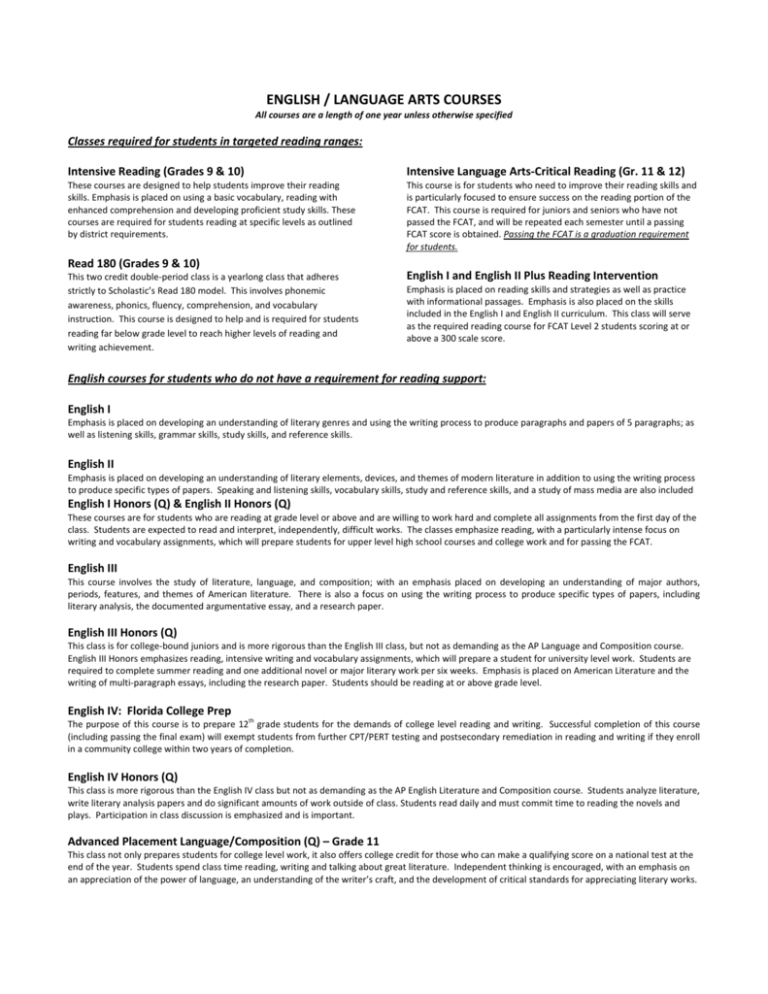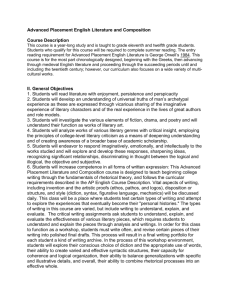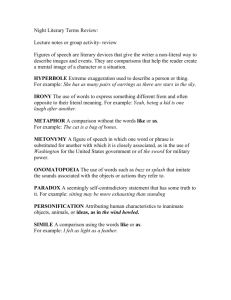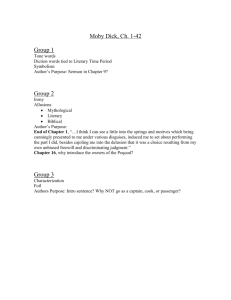ENGLISH / LANGUAGE ARTS COURSES
advertisement

ENGLISH / LANGUAGE ARTS COURSES All courses are a length of one year unless otherwise specified Classes required for students in targeted reading ranges: Intensive Reading (Grades 9 & 10) Intensive Language Arts‐Critical Reading (Gr. 11 & 12) These courses are designed to help students improve their reading skills. Emphasis is placed on using a basic vocabulary, reading with enhanced comprehension and developing proficient study skills. These courses are required for students reading at specific levels as outlined by district requirements. This course is for students who need to improve their reading skills and is particularly focused to ensure success on the reading portion of the FCAT. This course is required for juniors and seniors who have not passed the FCAT, and will be repeated each semester until a passing FCAT score is obtained. Passing the FCAT is a graduation requirement for students. Read 180 (Grades 9 & 10) English I and English II Plus Reading Intervention This two credit double‐period class is a yearlong class that adheres strictly to Scholastic’s Read 180 model. This involves phonemic awareness, phonics, fluency, comprehension, and vocabulary instruction. This course is designed to help and is required for students reading far below grade level to reach higher levels of reading and writing achievement. Emphasis is placed on reading skills and strategies as well as practice with informational passages. Emphasis is also placed on the skills included in the English I and English II curriculum. This class will serve as the required reading course for FCAT Level 2 students scoring at or above a 300 scale score. English courses for students who do not have a requirement for reading support: English I Emphasis is placed on developing an understanding of literary genres and using the writing process to produce paragraphs and papers of 5 paragraphs; as well as listening skills, grammar skills, study skills, and reference skills. English II Emphasis is placed on developing an understanding of literary elements, devices, and themes of modern literature in addition to using the writing process to produce specific types of papers. Speaking and listening skills, vocabulary skills, study and reference skills, and a study of mass media are also included English I Honors (Q) & English II Honors (Q) These courses are for students who are reading at grade level or above and are willing to work hard and complete all assignments from the first day of the class. Students are expected to read and interpret, independently, difficult works. The classes emphasize reading, with a particularly intense focus on writing and vocabulary assignments, which will prepare students for upper level high school courses and college work and for passing the FCAT. English III This course involves the study of literature, language, and composition; with an emphasis placed on developing an understanding of major authors, periods, features, and themes of American literature. There is also a focus on using the writing process to produce specific types of papers, including literary analysis, the documented argumentative essay, and a research paper. English III Honors (Q) This class is for college‐bound juniors and is more rigorous than the English III class, but not as demanding as the AP Language and Composition course. English III Honors emphasizes reading, intensive writing and vocabulary assignments, which will prepare a student for university level work. Students are required to complete summer reading and one additional novel or major literary work per six weeks. Emphasis is placed on American Literature and the writing of multi‐paragraph essays, including the research paper. Students should be reading at or above grade level. English IV: Florida College Prep th The purpose of this course is to prepare 12 grade students for the demands of college level reading and writing. Successful completion of this course (including passing the final exam) will exempt students from further CPT/PERT testing and postsecondary remediation in reading and writing if they enroll in a community college within two years of completion. English IV Honors (Q) This class is more rigorous than the English IV class but not as demanding as the AP English Literature and Composition course. Students analyze literature, write literary analysis papers and do significant amounts of work outside of class. Students read daily and must commit time to reading the novels and plays. Participation in class discussion is emphasized and is important. Advanced Placement Language/Composition (Q) – Grade 11 This class not only prepares students for college level work, it also offers college credit for those who can make a qualifying score on a national test at the end of the year. Students spend class time reading, writing and talking about great literature. Independent thinking is encouraged, with an emphasis on an appreciation of the power of language, an understanding of the writer’s craft, and the development of critical standards for appreciating literary works. Students are required to complete summer reading. Advanced Placement students are required to take the mid‐term course exam as well as the AP exam. Only motivated students who are willing to work very hard need register for this class. Advanced Placement English Literature and Composition (Q) – Grade 12 This class not only prepares students for college level work, it also offers college credit for those who can make a qualifying score on a national test at the end of the year. This is a demanding course, in which students analyze literature, write literary analysis papers, and take timed writings. It prepares students for college in all subjects because of the critical thinking required; and for English courses because of the literary analysis and timed writings. Students must be willing to read all the novels and plays, analyze poetry, and revise writings. Students must be committed to doing homework, writing in class, studying SAT vocabulary, studying literary terms, and preparing for the advanced placement examination. Class discussion is an essential part of this class. Advanced Placement students are required to take the AP exam. AP Disclaimer: Students enrolled in AP Language and/ or AP Literature will be required to complete a summer reading assignment. The summer reading assignment will be delivered shortly before the examination period at the close of second semester. Students may borrow the book from the school, from a public library, or purchase the book. Elective Language Arts Courses: Dual Enrollment Composition I (Q) This course is designed to develop composition skills. It emphasizes the development of the multi‐paragraph essay and includes practice in information retrieval from electronic and other sources, as well as in the selection, restriction, organization, and development of topics. It also offers the student opportunities to improve proficiency with sentence structure, diction, and mechanics. Selected writing samples are examined as models of form and as sources of ideas for the student's own writing. Dual Enrollment Composition II (Q) This course builds upon the skills developed in Composition I. It provides further instruction in the planning, organization, and writing of essays. It stresses methods of library research including information retrieval from electronic sources, and emphasizes writing of the research paper and the paper of literary interpretation. The reading includes selections from at least two forms of literature. Research in SAT Preparation (Grades 11‐12) (Length, Credit: Semester, ½) This semester long half‐credit course provides instruction and practice as a combination course for preparation in reading, writing, and mathematics sections of the Scholastic Aptitude Test (SAT) for college admission. Speech I, II (Length, Credit: Semester, ½) Students will develop oral communications skills through the use of formal and informal speaking situations. Emphasis is placed on using public speaking skills, listening skills, and group discussion techniques. Students will also analyze audiences for speaking purposes and evaluate speeches and speaking techniques. In level two, students will make formal speeches and participate in debate activities and formal discussion. Creative Writing I, II, III (Q) (Grades 9‐12) (Length, Credit: Semester, ½) Students develop skills in writing through the study of literary forms. Students use all aspects of the writing process to produce publishable pieces of writing. In level one, students evaluate representative examples of literature as models for writing. Later, students apply organizational, editorial and managerial skills in the production of publications. Journalism I (Grades 9‐12) This course provides students with instruction in basic aspects of journalism and workshop experiences in journalistic production. Emphasis is placed on identifying and describing elements of the history and traditions of journalism as well as organizing and utilizing appropriate production modes. Journalism I, II, III (Q), IV (Q) Newspaper/Yearbook Successful completion of the previous level and teacher approval is a prerequisite. These courses develop/refine journalistic writing skills through practice. Students create the newspaper or yearbook, which involves writing, graphic design, & photographic techniques. Selling advertisements for the publication is a course requirement. Disclaimer: Students in all levels of Creative Writing and/or Journalism will be expected to participate in after school activities involving fund raising. All are expected to assist with developing business contacts for the two publications, the Kaleidoscope and the Packer Press. Students will be expected to sell advertising space for both publications. Failure to do so may constitute lowering an academic grade. Students will work as a team and answer to classmates in leadership roles.









